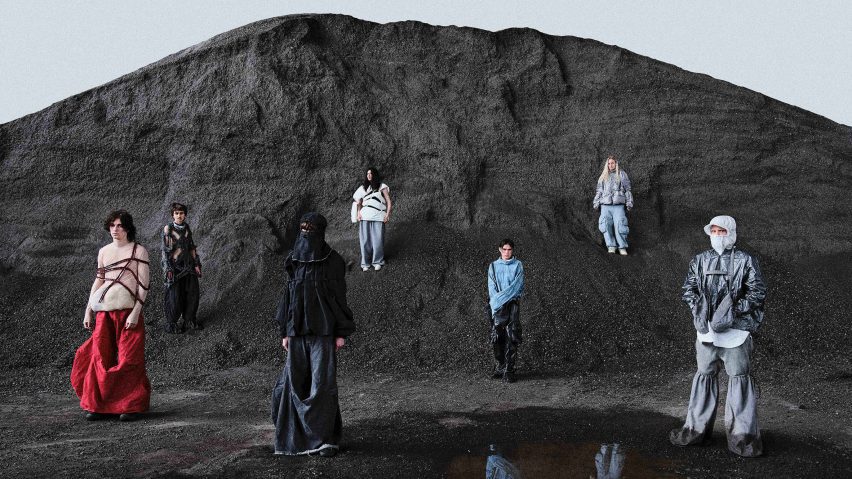
Ten student design projects featured in the Designblok Diploma Selection
Dezeen School Shows: a modular system of furniture that promotes sustainability is included in Dezeen's latest school show by students featured in the Designblok Diploma Selection.
Also included is a 3D-printed water filter made from ceramics and a fashion collection that is crafted from recycled materials and inspired by the Japanese concept of wabi-sabi.
Designblok Diploma Selection
Institution: Designblok, Prague International Design Festival
Courses: Industrial Design, Interior Design, Product Design and Fashion Design (BA and MA)
Statement:
"The Designblok Diploma Selection talent competition, organised by the festival in cooperation with the EUNIC Cluster Czech Republic to develop and support graduates of European universities, will welcome new jurors on the occasion of its tenth anniversary.
"The chair of the jury for the product design category and director of the Museum für Kunst und Gewerbe Hamburg, Tulga Beyerle, has invited Thomas Geisler, director of the Dresden State Art Collections, Jan Boelen, independent curator and artistic director of LUMA Atelier, Alexandra Midal, independent curator, filmmaker and professor at HEAD–Genève and Evelien Bracke, curator of the Design Museum in Ghent, to join the jury.
"At the invitation of the chair of the fashion design category jury is journalist and creative director Jan Králíček, with the competition's jury to include Krzysztof J. Lukasik, Polish designer, creative director and consultant for brands like Loewe, Hermès, Diesel, Lanvin and others, alongside Greek fashion critic and journalist Sotiris Kaberis and lastly, Alexandre Malgouyres, consultant and former Gucci communications director.
"The expert jury of the Designblok Diploma Selection competition will choose winners from thirty final projects, who will receive a financial reward of 4,000 euros and the opportunity to present at the next Designblok.
"The winners will be announced during the Designblok Diploma Selection Awards Ceremony on Saturday, October 5, at 7 pm in the Lobkowicz Palace at Prague Castle, in the presence of international juries, journalists and curators. The full list of winners will also be available on designblok.com.
"New projects will be presented at Bastion Florenc by last year's finalists Willemsen Esmée, Beau Janek, Julia Huhnholz and Friedrich Gerlach, with a showcase from fashion designer Maria Czarnecka at the Lobkowicz Palace.
"The partner of the Designblok Diploma Selection for 2024 is Ploom."
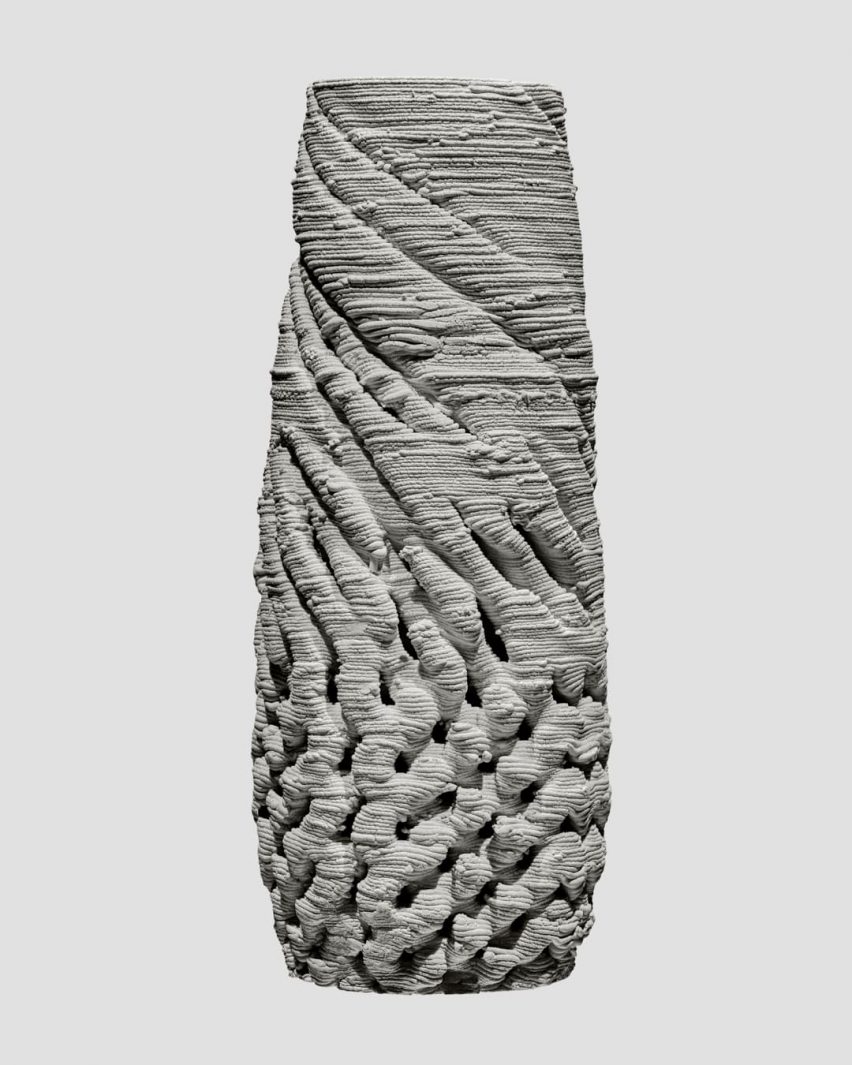
Dodola by Žan Girandon, Pia Groleger and Luka Pleskovič
"The thesis designs a solution for unmonitored water catchments.
"It examines a spring in Triglav National Park where high E. coli levels have been detected.
"The proposed solution consists of a ceramic filtration system using 3D clay printing technology, which is suitable for remote locations and does not require electricity or regular supplies.
"Utilising a gyroid structure and an Archimedean screw, they harness water flow to operate autonomously.
"The solution provides clean drinking water and empowers communities."
Students: Žan Girandon, Pia Groleger and Luka Pleskovič
Course: MA Industrial Design
School: Academy of Fine Arts and Design of the University of Ljubljana
Email: pjorkkala[at]gmail.com
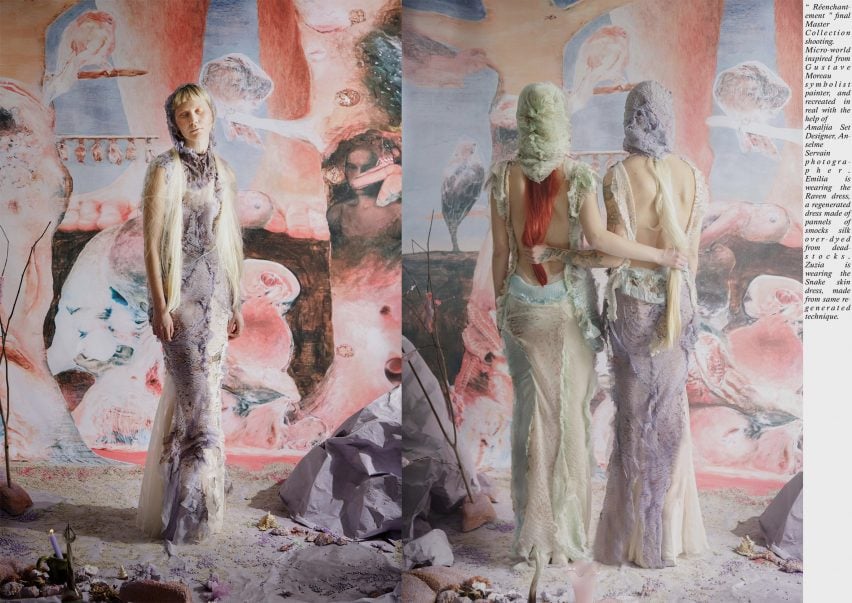
Réenchantement – Bring back the Magic by Carla Boré
"In response to our world crisis, Réenchantement focuses on reviving the magic and the mystery that we have lost.
"I wanted to highlight the weird beauty of life, poetry and tolerance.
"Inspired by my surroundings, a new mythology transforms chimaeras into beautiful heroes.
"I wanted to honour artisanal craftsmanship, showcasing techniques and the power of human collaborations blending tradition with innovation."
Student: Carla Boré
School: Institut Français de la Mode
Course: Master in Fashion Design
Email: carla.bore[at]outlook.fr
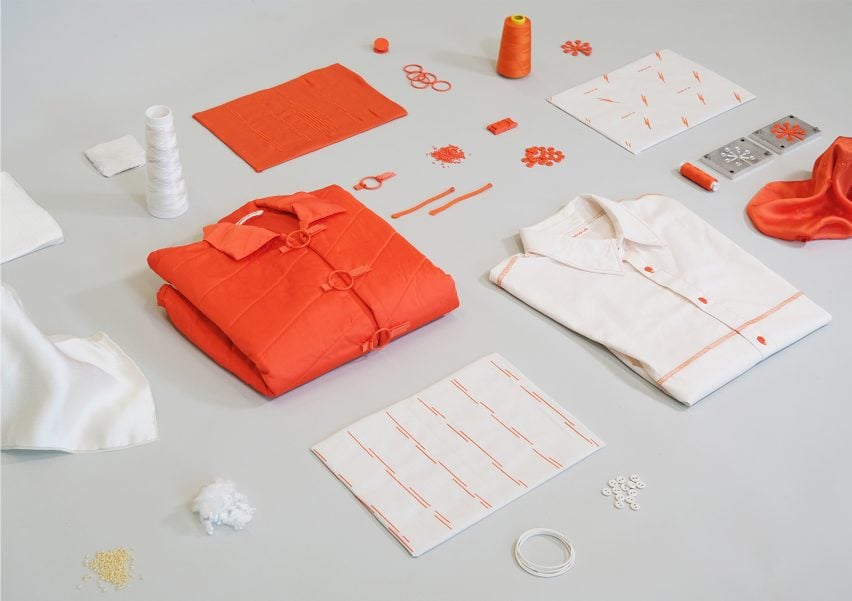
Break-up Lab by Sophia Reißenweber
"Break-up Lab is dedicated to the end of an emotional relationship: that between the textile and its previous owners.
"Through biotechnological processes, the polyester content in used textiles can be broken down and the recovered building blocks can then be metabolised into a biodegradable plastic.
"Yarns and add-ons made from PHA facilitate the easier separation of impurities and enable fibre-to-fibre recycling.
"Two circular clothing items showcase the aesthetic and functional potentials."
Student: Sophia Reißenweber
School: Burg Giebichenstein University Halle
Course: Industrial Design
Email: sophia.reissenweber[at]posteo.de
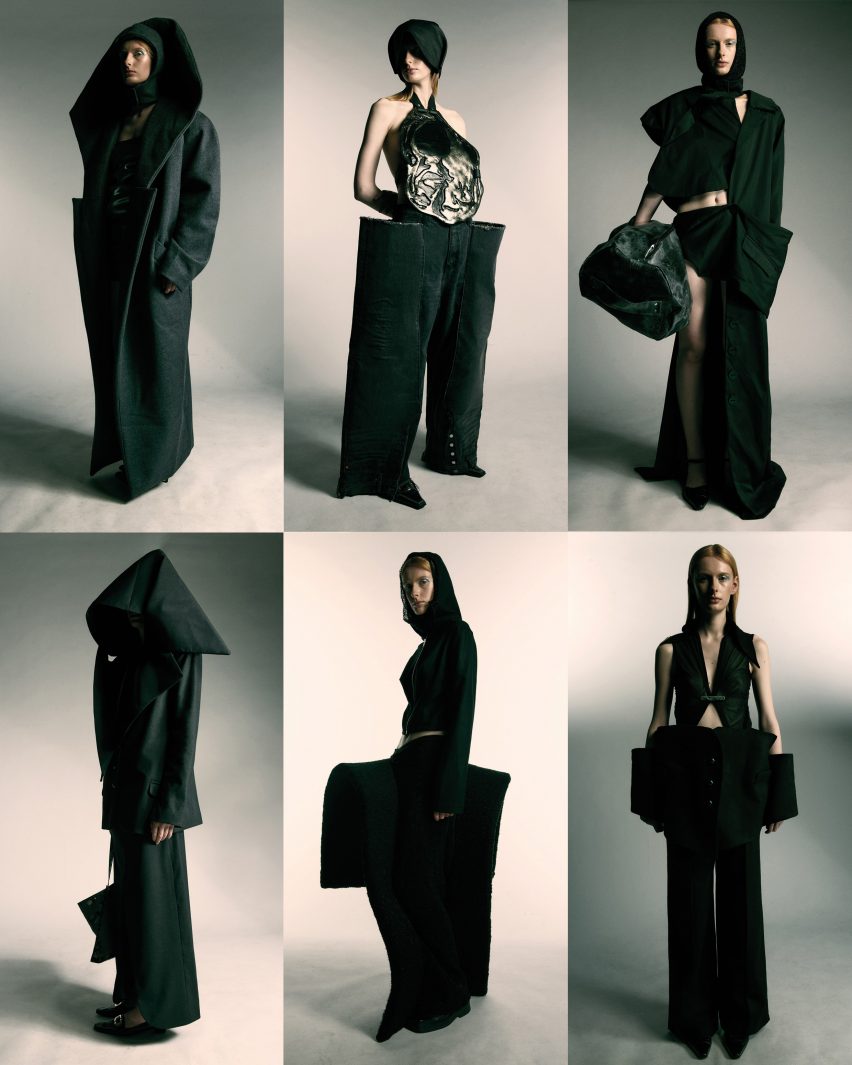
Equilibrium – Womenswear Collection by Wiktoria Król
"My graduate collection Equilibrium is inspired by my health problems related to visual disturbances and the mechanisms of MRI.
"The silhouettes are minimalistic but disrupted in a way where they appear to be stuck between balance and its complete absence.
"The collection includes unique materials such as self-designed jacquards, melted PVC foil, iron filings with magnets and silvered epoxy resin."
Student: Wiktoria Król
School: Strzemiński Academy of Fine Arts Łódź
Course: Fashion Design
Email: wiktoriawkrol[at]gmail.com

But by Reflection by Nouka Rous
"Exploring a sense of self within society's expectations of femininity, my collection takes place in that fictive moment when a person gradually transforms into their true self.
"Using restrictive body language and materiality to tell this story, I have made fragile sculptures, their protective shells and vulnerable transparencies falling away like discarded cocoons.
"I work in slow fashion – handcrafted pieces from deadstock fabrics for an audience who values fashion as a political, performative art form."
Student: Nouka Rous
School: ArtEZ University of the Arts
Course: Fashion Design
Email: nouka.rous[at]xs4all.nl
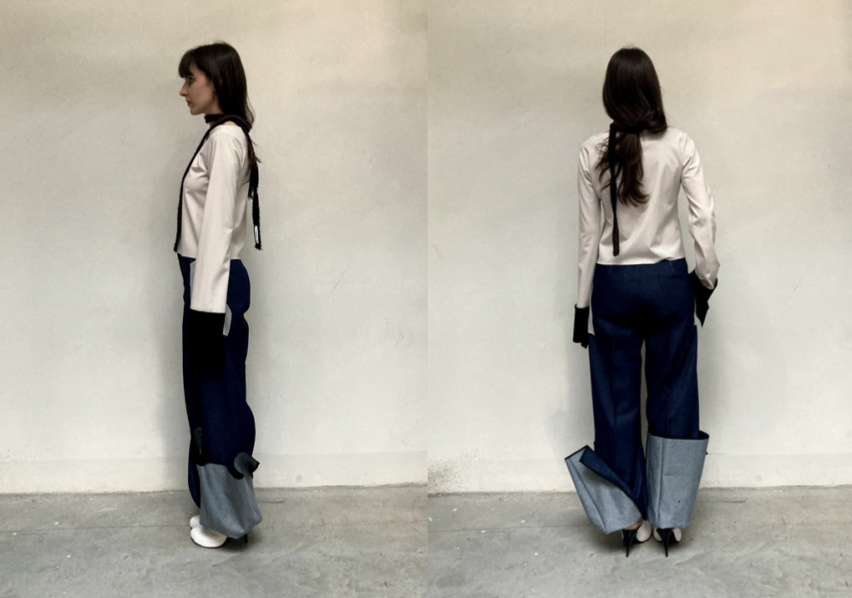
Wardrobe by Aleš Hnátek
"The clothing collection combines principles of haute couture seen on catwalks with those of wearable apparel.
"The inspiration of the Arte Povera movement and Japanese wabi-sabi can be seen in the selection of materials which come from dead-stock sources as well as from a personal archive of unique textiles, for instance those used in furniture upholstery.
"The collection thus draws attention to the value of abandoned materials and coupled with meticulous craftsmanship and a timeless aesthetic, it remains firmly dedicated to the idea of sustainability."
Student: Aleš Hnátek
School: University of Applied Arts in Prague
Course: Clothing and Footwear Design Studio
Email: aleshnatek[at]gmail.com
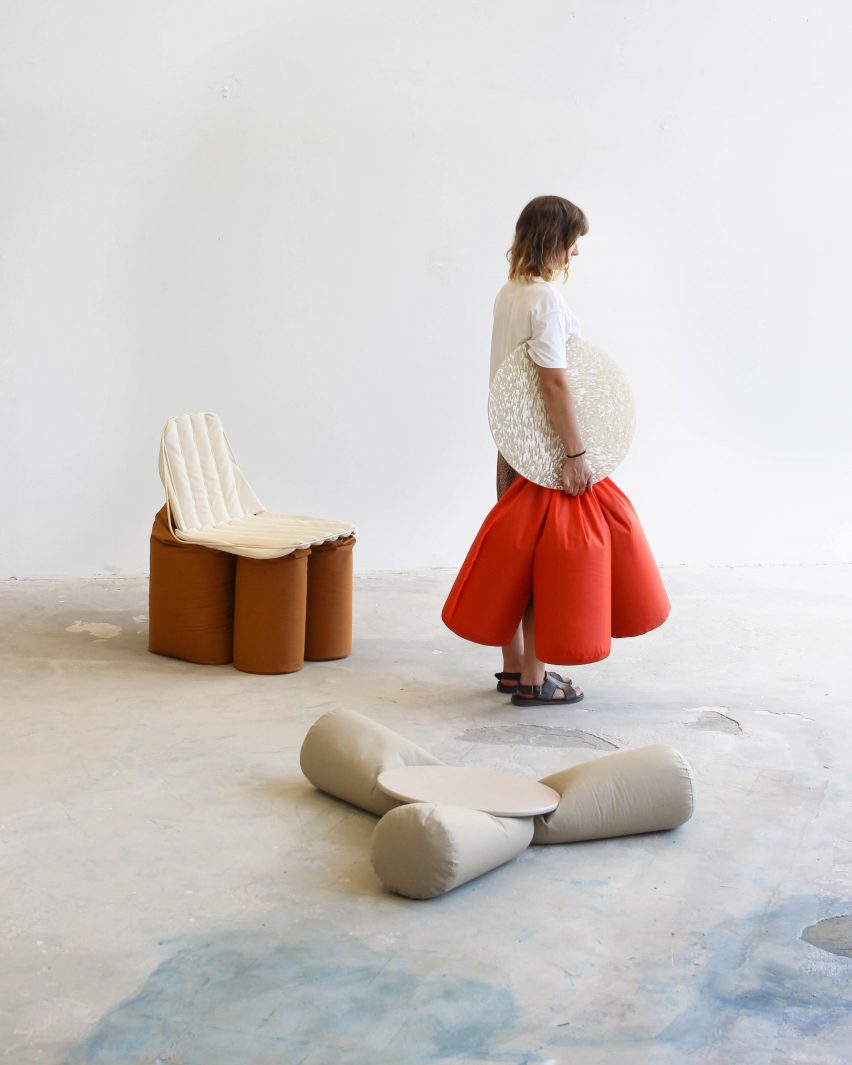
Up and Down by Tímea Kepová
"The Up and Down collection explores the question of leisure seating.
"In today's world, where everyone seems to be sitting all the time, I understand leisure as a way of achieving creativity through bodily movement.
"These objects ensure that each sitting is a unique experience.
"They support sitting or laying on the ground by means of higher standard positions.
"The work builds on the motto that 'nothing changes without a change' and leaves it up to us to decide how we understand the need for change and transformation."
Student: Tímea Kepová
School: Interior Design
Course: VŠVU Bratislava
Email: timkepov[at]gmail.com
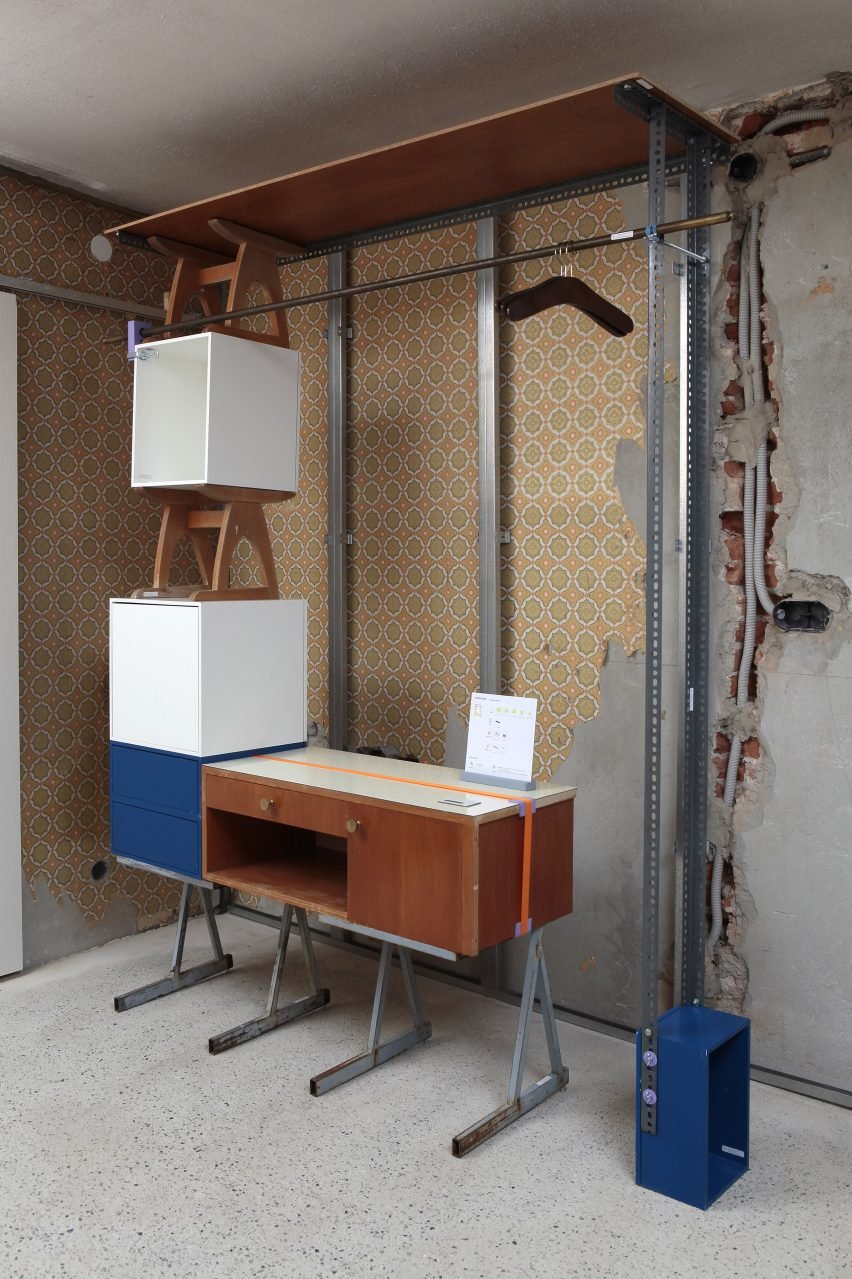
Reconfigured – A Reuse Strategy for Discarded Furniture by Stephanie Bauer
"Reconfigured repurposes discarded furniture elements using an innovative modular kit system.
"Parts are sorted by type and function, then reassembled into new pieces by using schemes.
"This method preserves the integrity of the original elements while reimagining existing ideas about structures as wholes.
"The resulting reconfigurations are modular and adaptable, promoting sustainability.
"The project emphasises furniture as durable goods and challenges perceptions: is it trash or valuable furniture?"
Student: Stephanie Bauer
School: New Design University
Course: Manual and Material Culture
Email: st_bauer[at]outlook.com
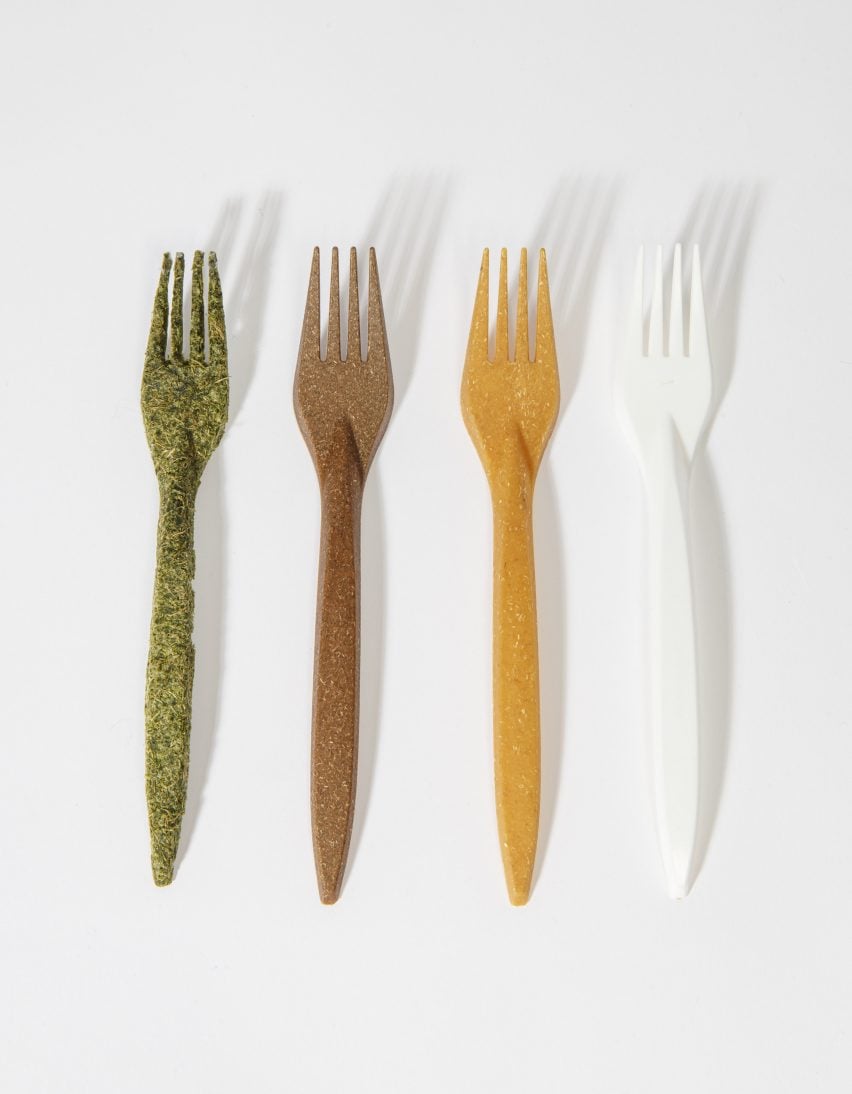
Paradox of Isoëtes: Future of Almost Lost Species by Adam Kvaček
"The Paradox of Isoëtes consists of a speculative approach to research done on the endangered Isoëtes plant across its various interactions based in human-nature relations.
"The project's speculative aspect is based on the idea that the easiest way to save an extinct species is to make it useful to humans.
"I focus on the process of commodification of plants by creating material from the given species and turning it into a consumer good, depicted in the form of disposable cutlery as a symbol of consumer society."
Student: Adam Kvaček
School: Academy of Arts Architecture and Design in Prague
Course: Product Design
Email: adamkvacekcz[at]gmail.com
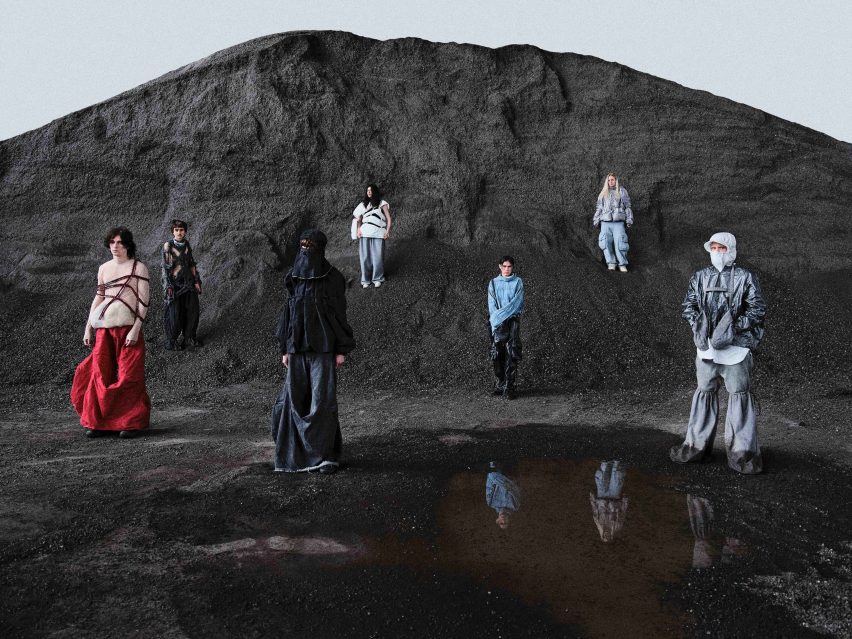
Lost Product of Society by Peter Wertmann
"This diploma work collection captures the essence of Arctic and Antarctic exploration, fused with the freedom of growing up in the Swiss Alps.
"The structure draws on the experience of military life, embodying the contrasts between vast open landscapes and disciplined, confined living."
Student: Peter Wertmann
School: Royal Academy of Arts The Hague
Course: BA Fashion and Textiles
Email: wertmannp[at]gmail.com
Partnership content
This school show is a partnership between Dezeen and Designblok Diploma Selection. Find out more about Dezeen partnership content here.